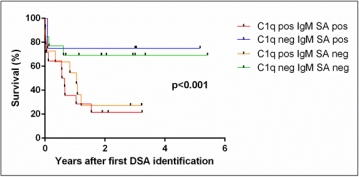IgM Donor Specific Antibodies Are Frequently Associated with C1q-binding DnDSA in Renal Transplant Recipients.
1Nephrologie, Charite Universität Medizin, Berlin, Germany
2HLA Labor, Charite Universität Medizin, Berlin, Germany
3Nephrologie, CHU Jean Minjoz, Besançon, France
4Erasmus Medical Centre, Rotterdam, Netherlands.
Meeting: 2016 American Transplant Congress
Abstract number: 280
Keywords: Antibodies
Session Information
Session Name: Concurrent Session: Antibody Mediated Rejection in Kidney Transplantation: De Novo DSA
Session Type: Concurrent Session
Date: Monday, June 13, 2016
Session Time: 4:30pm-6:00pm
 Presentation Time: 5:18pm-5:30pm
Presentation Time: 5:18pm-5:30pm
Location: Ballroom B
Background: Recently, the importance of complement-binding de novo DSA (dnDSA) was documented. We aimed to explore the presence of IgM dnDSA according to C1q dnDSA-binding capacity.
Material and Methods: Since 2007, we screened all patients in our outpatient department at annual intervals for the presence of DSA. We selected 59 renal transplant recipients with dnDSA, adequate serum samples available and complete follow up after first detection of dnDSA. All samples were analyzed for the presence of C1q-binding and IgM dnDSA.
Results: From the 59 patients, 37 developed ABMR during a mean follow-up of 37±28 months and 22 patients had no clinical or biological signs of graft dysfunction during follow-up (34±17 months).The groups were comparable for baseline characteristics. At time of first IgG dnDSA detection 35 patients were C1q-positive (26/37 in ABMR and 9/22 in ABMR-free group, p=0,026) and 24 C1q-negative. Forty-six (28 C1q-positive and 18 C1q-negative) patients have been also explored for the presence of IgM dnDSA. 14/28 (50%) C1q-positive and only 4/18 (22%) C1q-negative samples were also positive for IgM dnDSA (p=0.020). 11/14 C1q-positive IgM dnDSA-positive (79%) compared to 1/4 (25%) C1q-negative IgM dnDSA-positive developed an ABMR (p=0.045). 8/14 C1q-positive IgM dnDSA negative (57%) and 5/14 (36%) C1q-negative IgM dnDSA negative developed an ABMR (p=0.26).
ABMR-free survival could be stratified according to C1q and IgM dnDSA status and overall comparison of Kaplan Meier showed statistical significant differences between curves (p<0.001)  .
.
Conclusion: We demonstrate that C1q positivity is associated with a higher frequency of IgM dnDSA in the serum (50%). Moreover presence of IgM dnDSA in C1qdnDSA positive patients is associated with more than 75% of ABMR. Finally we are able to show that C1q and IgM dnDSA positivity at time of first IgG dnDSA detection was associated with the highest risk of ABMR occurrence.
CITATION INFORMATION: Bamoulid J, Roodenburg A, Staeck O, Schoenemann C, Lachmann N, Budde K. IgM Donor Specific Antibodies Are Frequently Associated with C1q-binding DnDSA in Renal Transplant Recipients. Am J Transplant. 2016;16 (suppl 3).
To cite this abstract in AMA style:
Bamoulid J, Roodenburg A, Staeck O, Schoenemann C, Lachmann N, Budde K. IgM Donor Specific Antibodies Are Frequently Associated with C1q-binding DnDSA in Renal Transplant Recipients. [abstract]. Am J Transplant. 2016; 16 (suppl 3). https://atcmeetingabstracts.com/abstract/igm-donor-specific-antibodies-are-frequently-associated-with-c1q-binding-dndsa-in-renal-transplant-recipients/. Accessed February 28, 2026.« Back to 2016 American Transplant Congress
